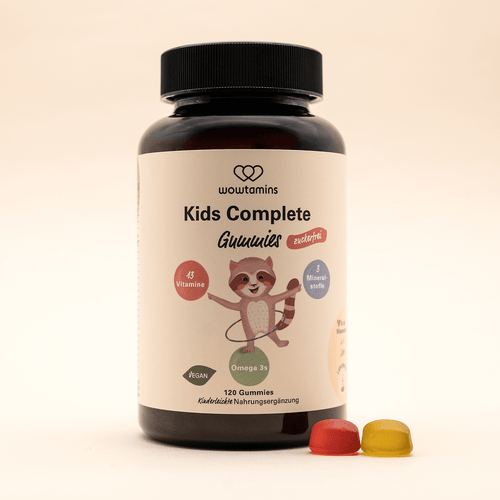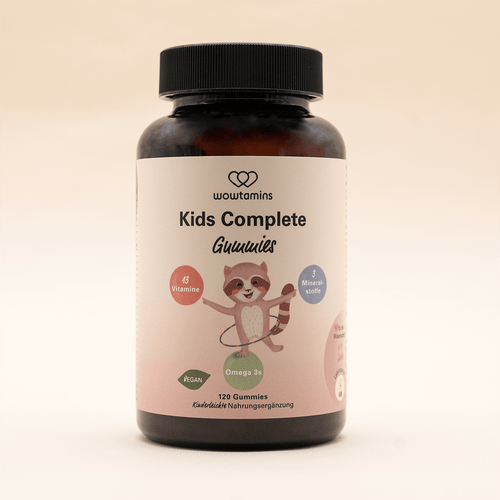Themen dieses Blogartikels:
What is vitamin E?
Vitamin E is a fat-soluble vitamin with the medical name tocopherol or tocotrienol. There are eight different variants of vitamin E, for example alpha-tocopherol and beta-tocopherol.1
What are the functions of vitamin E?
Vitamin E has one main function: to protect against oxidative stress. The vitamin protects your cell membranes from radicals and thus ensures the survival of your cells. Vitamin E thus prevents a chain reaction during lipid peroxidation. This process, the oxidation of lipids, is associated with the inflammatory vascular disease arteriosclerosis, as lipid molecules also oxidize and accumulate here.2
What makes vitamin E unique?
Most antioxidants are water-soluble. But not vitamin E: it is a very strong fat-soluble antioxidant.3
How much vitamin E do you need per day?
The German Nutrition Society (DGE) gives the following estimates for an adequate vitamin E intake:
| Alter | Tocopherol mg-equivalent/day male | Tocopherol mg-equivalent/day female | Infants |
| 0 to under 4 months | 3 | 3 |
| 4 to under 12 months | 4 | 4 | Children and teenagers |
| 1 to under 4 years | 6 | 5 |
| 4 to under 7 years | 8 | 8 |
| 7 to under 10 years | 10 | 9 |
| 10 to under 13 years | 13 | 11 |
| 13 to under 15 years | 14 | 12 |
| Teenagers and adults | ||
| 15 to under 19 years | 15 | 12 |
| 19 to under 25 years | 15 | 12 |
| 25 to under 51 years | 14 | 12 |
| 51 to under 65 years | 13 | 12 |
| 65 years and older | 12 | 11 |
| Pregnant Women | 13 | |
| Breastfeeding | 17 |
When do you need vitamin E most?
Vitamin E is particularly important in the regeneration of cell membranes after inflammation and injury. Vitamin E can also contribute to wound healing.5 By reducing the oxidation of lipids, vitamin E offers potential support for high blood lipid levels (LDL, oxLDL).6
How does an vitamin E deficiency develop and how does it manifest itself?
A diet-related vitamin E deficiency is unlikely in this country. The recommended daily intake can easily be achieved through a balanced, varied diet.7 If a deficiency does occur, it is probably due to impaired fat absorption in the intestine. Possible reasons for this could be, for example, chronic pancreatitis, coeliac disease, Crohn's disease or other inflammatory bowel diseases. As a result, symptoms such as circulatory disorders, muscle weakness and tremors can develop. In children in particular, slower reactions and a loss of coordination are also possible.8
What happens if there is an overdose of vitamin E?
According to the Federal Institute for Risk Assessment (BfR), an intake of 30 mg of vitamin E per day should not be exceeded for food supplements.9 If you take too much vitamin E over a longer period of time, you may suffer from gastrointestinal problems and an increased risk of bleeding, among other things.10
Which foods are particularly high in vitamin E?
Vitamin E is found in many vegetable oils, but less so in animal products. Wheat germ oil, rapeseed oil and almond oil, for example, contain vitamin E. Nuts and seeds such as sunflower seeds, linseed and hazelnuts are also good sources of vitamin E.
This dictionary entry is based on carefully researched sources:
Bibliography & Sources
- flexikon.doccheck.com/de/Tocopherol
- verbraucherzentrale.de/wissen/lebensmittel/futterrgaenzmittel/vitamin-e-zum-schutz-vor-herzinfarkt-und-krebs-13834
- thieme-connect.com/products/ejournals/abstract/10.1055/a-1797-6105
- dge.de/science/referenzvalues/vitamin-e
- netdoktor.de/laborwerte/vitamin-e/
- pharmazeutische-zeitung.de/medizin2-24-1998/
- netdoktor.de/laborwerte/vitamin-e/lack/
- msdmanuals.com/de-de/heim/ern%C3%A4hrungsst%C3%B6rungen/vitamins/vitamin-e-lack#Ursachen_v45106678_de
- bfr.bund.de/cm/343/hoechstmengevorschlaege-fuer-vitamin-e-in-lebensmittel-inklusive-smittelergaenzsmitteln.pdf
- gesundheit.gv.at/leben/ernaehrung/vitamin-mineralstoffe/fettloesliche-vitamin/vitamin-e.html























